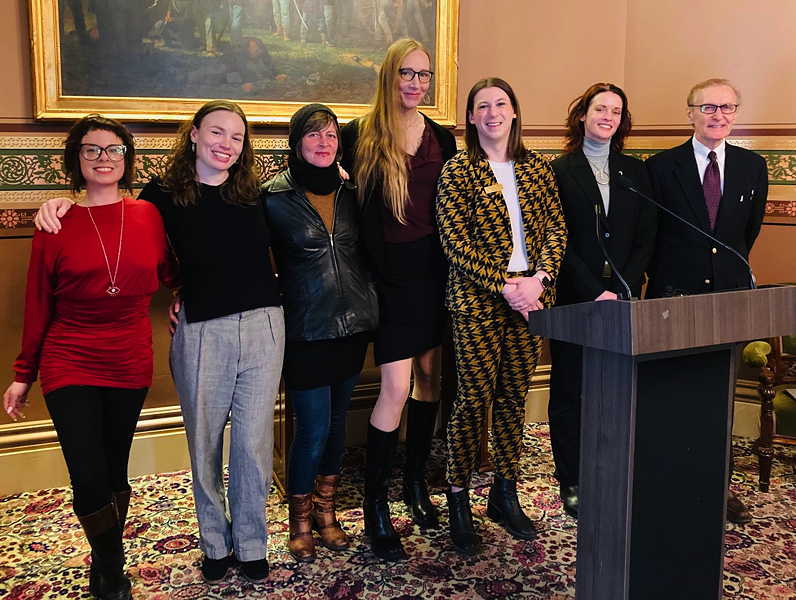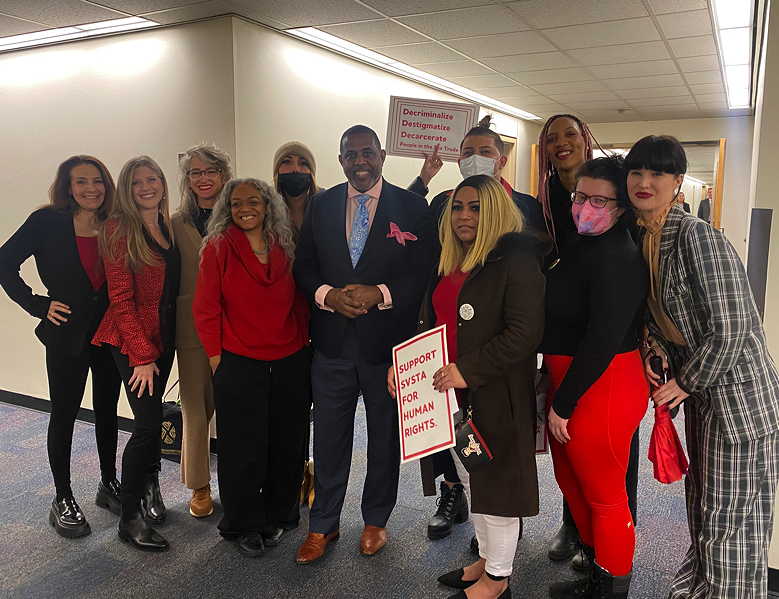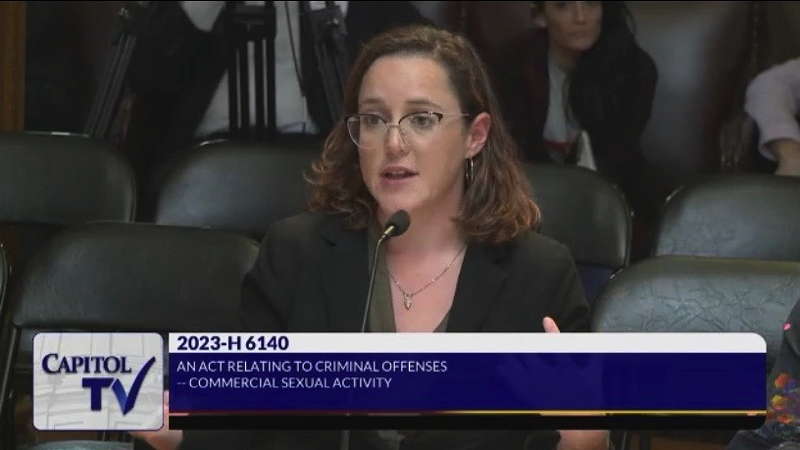March 16, 2023
Elected officials, law-enforcement officials, sex workers, and anti-trafficking and sex workers’ rights advocates gathered to announce the introduction of S.125, an act related to voluntary engagement in sex work, and its companion bill in the House of Representatives, H.372. Lead senate sponsor Senator Becca White (D-Windsor) was joined by nine co-sponsors and 13 other representatives signed on with lead house Sponsor Representative Taylor Small (P/D-Winooski). Each bill, which would repeal the state’s archaic prostitution laws, has been referred to its chamber’s judiciary committee.
State’s attorneys Michelle Donnelly (Washington), Ward Goodenough (Windsor), Vince Iluzzi (Essex County), and Ian Sullivan (Rutland) joined the bills’ supporters at the Vermont State House. Chittenden County State’s Attorney Sarah George, not in attendance, has stated her support for the decriminalization of consensual adult sex work.
“Regardless of how one feels about prostitution personally, I hope we can all agree that criminalizing it is wrong for so many reasons. Our laws should be rooted in reality and data, instead of morality and ideology. This bill reflects Vermont’s commitment to personal and bodily autonomy and individual liberty,” said Senator Becca White (D-Windsor).
“Criminalization compromises access to resources, endangers public health, and allows violence against sex workers to go unchecked. Criminalization also fails to protect trafficking survivors. Decriminalization is a well-researched, practical, and simple step we can take in the fight against trafficking, while we work to address the nuanced causes of trafficking and invest in meaningful resources that support victims,” said Representative Taylor Small (P/D-Winooski).
“We all share a common goal of protecting our most vulnerable residents from trafficking, violence, and exploitation and it’s clear that criminalizing and stigmatizing the sex trade does not do this. Those of us trusted with the power to make, change and enforce laws have a duty to pay attention to evidence that shows us when we can do better. Modernizing our prostitution laws only reinforces our commitment to fighting trafficking and exploitation,” said Windsor County State’s Attorney Ward Goodenough.
“Through the decriminalization of consensual adult sex work, Vermont has a powerful opportunity to put its values into action. Those values are autonomy, community safety, and the recognition of the inherent dignity and humanity of all individuals. The best way to keep somebody trapped in a system of oppression is to keep them in a cycle of criminality and stigma. I want to get old, and I want to see my friends get old. I want us to live and thrive not under scrutiny, but in mutual respect and real community care,” said Henri Bynx, co-founder of The Ishtar Collective, Vermont’s only organization run by and for consensual adult sex workers and survivors of human trafficking.
Vermont legislators have introduced decriminalization bills in past sessions, but this is the first time that the Senate has also introduced a decriminalization bill. The bills would repeal the state’s laws prohibiting both prostitution and “indiscriminate sex.” Support for decriminalization and sex workers’ rights is gaining traction in Vermont.
On March 21, the House Committee on Judiciary heard testimony from DSW Staff Attorney Rebecca Cleary, Emma Honingford of The Ishtar Collective, and a researcher from Yale University on the importance of passing H.22, “An act relating to sexual exploitation of a person who is being investigated by law enforcement.” H.22 states that “No law enforcement officer shall engage in a sexual act with a person whom the officer is investigating, detaining, arresting, or otherwise holding in custody or who the officer knows is being investigated, detained, arrested, or otherwise held in custody by another law enforcement officer.” Vermont already has a law banning sexual contact between a law-enforcement officer and an individual in their custody, stating that this interaction would inherently be non-consensual because the power differential between law enforcement and civilians is too great. Passing this ban on investigative sex would make Vermont’s law on custodial sex complete and offer robust protections from police sexual violence.
Read coverage of Vermont’s pending decriminalization legislation here and here.
Watch the press conference at Vermont’s State House announcing the bills here.

Members of The Ishtar Collective, allies, and elected officials following the announcement of the introduction of the bills.
DSW Newsletter #46 (March 2023)
Decriminalization Advocates Fill the NY State Capitol

DSW Testified on Important Sex Work Related Bills in RI

VT Senate and House Introduce Decriminalization Bills

Making Sex Work an Honest Business Makes Communities Safer | New York Law Journal

